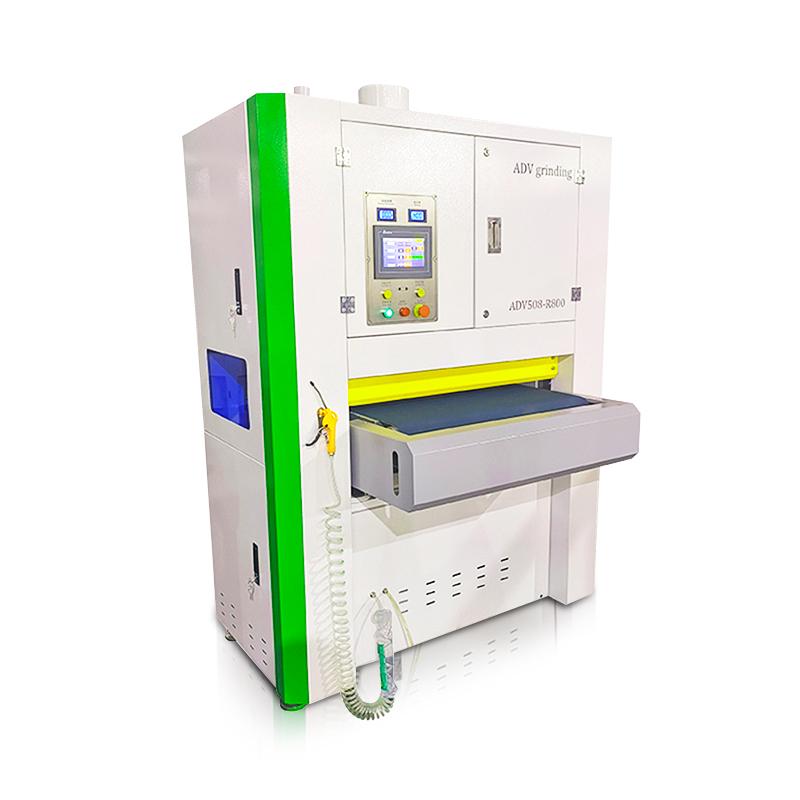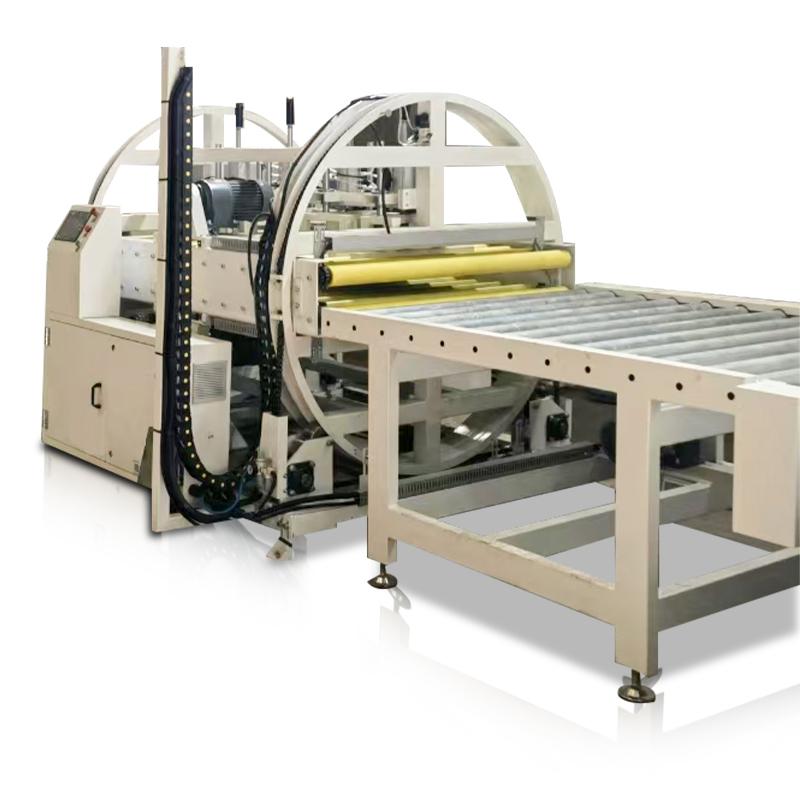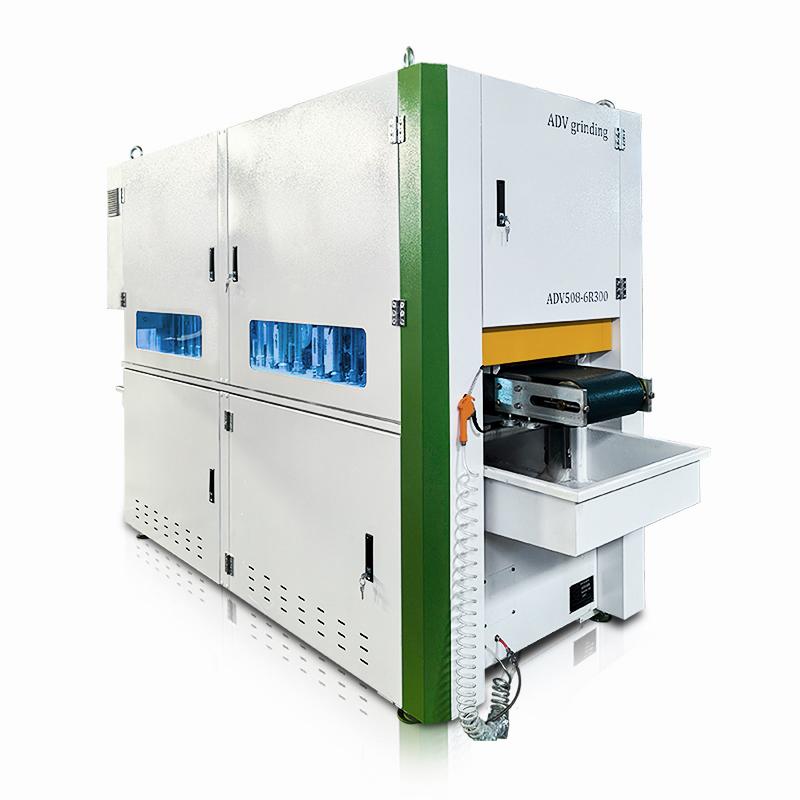How a Metal Finishing Deburring Machine Solves Common Sheet Metal Surface Problems
Jul 4 ,2025
You need an effective solution to address issues on sheet metal, and a metal finishing deburring machine is essential for making the surface smooth and safe. This deburring machine removes burrs and imperfections that occur during manufacturing. Surface quality is crucial for both safety and appearance, especially when aiming for finishes like No.4 or hairline. These finishes enhance the look and performance of your products. Using a metal finishing machine or metal polishing machine provides more precision than manual methods, ensuring consistently superior results every time.
Key Takeaways
- Metal finishing deburring machines take away sharp burrs and scratches. They also fix rough edges. This makes sheet metal smooth, safe, and nice to look at.
- These machines help make finishes like No.4 and hairline. These finishes make metal parts look better. They also help metal last longer in many industries.
- Automated deburring machines make work safer. They cut down sharp edges and dust. This lowers the chance of getting hurt or having fires at work.
- Deburring machines help work go faster. They cut down on mistakes and save money on workers. This helps companies save time and money.
- Deburring gives metal a smooth and clean surface. This makes products better. It also makes parts easier to put together. Coatings stick better and last longer, too.
Surface Problems
Burrs
Burrs are tiny, rough pieces of metal that stick out after cutting. You can find them on the edges of sheet metal parts. Burrs are sharp and can hurt your hands. They also make it hard for parts to fit together. This can cause trouble when putting things together. Many factories look for burrs by eye, but this is not always good enough. When things move fast, people can miss burrs. Some machines use deep learning to find burrs. But bright lights and shiny spots can make it hard for these machines to work.
Scratches
Scratches are lines or marks on the metal. They can happen when tools get old or from rough handling. When tools wear out, the metal gets rougher. Scratches get deeper and easier to see. For example, if a tool coating wears off, roughness can go from 0.6 to over 2 micrometers. Scratches make the metal look bad. They also make the surface weaker and more likely to break.
Uneven Edges
Uneven edges happen when cutting or shaping does not go well. You might see cracks, folds, or wavy lines on the edge. Bad tools or wrong settings can cause these problems. Research shows that cracks and shape changes can happen from uneven bending. These problems make parts hard to put together. They also make the parts weaker.
Contamination
Contamination means things like oil, dust, or rust on the metal. These can come from tools, packaging, or the air. Contamination can:
- Stop coatings from sticking right.
- Cause problems like pits or splits on the surface.
- Make cleaning and checking cost more.
For example, grease from tools can make paint peel off. Dust can make the surface look bad. Washing or scrubbing the metal helps get rid of these things.
To get a smooth, nice finish like No.4 or hairline, you need to fix these problems. If you remove burrs, scratches, uneven edges, and contamination, your sheet metal will look better and work better in the end.
How It Works
Grinding Process
When you use a metal finishing deburring machine, you begin with grinding. Abrasive belts move fast over the metal surface. These belts take off burrs and make rough spots smooth. You can pick different grit sizes for the finish you want. Rotary tools like grinding stones or carbide burrs help with hard burrs and shaping edges. Some machines use vibration to rub the metal with abrasive media. This works well for big batches and gives even results. CNC machines can work on tricky shapes and make every part look the same.
- Abrasive belts take off burrs quickly and can run by themselves.
- Rotary tools are good for tough or small spots.
- Vibratory machines finish lots of parts at once.
- CNC machines give exact and repeatable results.
You can choose the best way for your job. Each method helps you get a smooth, safe, and clean surface.
No.4 Finish
The No.4 finish is a top choice for sheet metal. You get this finish by using the machine with a special abrasive belt. The process makes short, clear lines on the metal. When you look, you see a pattern like snowflake silk. This finish looks nice and hides small scratches or marks. People use it in kitchens, elevators, and places where looks matter.
Tip: The No.4 finish makes products look fancy and keeps the surface safe from daily use.
Hairline Finish
If you want a long, straight texture, pick the hairline finish. The machine makes this by moving the abrasive in one direction. This makes straight, even lines across the sheet. High-resolution imaging tools check the surface for even lines and no defects. These tools can find tiny scratches or dents you might not see. Profilometers check the roughness to make sure the finish is right.
| Finish Type | Appearance | Common Uses |
|---|---|---|
| No.4 | Short, silk-like lines | Appliances, panels |
| Hairline | Long, straight lines | Decorative panels |
Both finishes make your sheet metal look better and work better. You get a surface that is easy to clean and hard to damage.
Surface Solutions
Burr Removal
Burrs show up on sheet metal after cutting or punching. These sharp edges can hurt people and make it hard to put parts together. A metal finishing deburring machine takes away burrs fast and safely. You can pick from different ways to do this, like mechanical, electrochemical, or thermal deburring. Each way works best for certain parts and jobs.
- Mechanical deburring is used a lot in making cars and machines. It can handle many parts at once and gives the same results each time.
- Electrochemical deburring is good for making airplane and medical parts. It makes smooth edges without hurting the metal.
- Thermal deburring is great for tricky shapes, like those in hydraulic systems.
Many factories now use machines to do deburring by themselves. In North America, 39% of shops use these systems. They help work go faster and lower mistakes. For example, one car company uses vibratory deburring to finish 400 brake calipers at once. This helps them make more parts.
Burr removal is not just for safety. It also helps you follow rules and makes your products better.
Edge Smoothing
Sharp or rough edges can make sheet metal weak and cause cracks. Edge smoothing makes these edges round and even. This helps the parts look better and last longer. Studies show that smoothing the edge lowers roughness and stops damage. It also helps the metal bend without cracking.
When you smooth edges, you get:
- Easier bending
- Less cracking at the edge
- Parts that last longer
A study by K.-i Mori and his team found that edge smoothing lets holes stretch more before breaking. This is important for making strong and even parts.
Surface Uniformity
Smooth surfaces look nice and last longer. You want every part to have the same finish. A metal finishing deburring machine helps by using exact tools and controls. These machines can make surfaces as smooth as 4 Ra or better. This smoothness means you may not need extra polishing.
Turbo-Abrasive Machining (TAM) is another way to get very even finishes. TAM makes surfaces that are flat and strong. It works fast and can handle hard shapes. You get the same quality for every part and batch.
Smooth surfaces matter in high-tech jobs. Many makers want an 8 Ra finish. Automated deburring machines help you reach or beat this goal.
Contaminant Removal
Things like oil, dust, or metal bits can ruin the finish. They can also stop coatings from sticking and cause problems. During deburring, machines use belts and brushes to clean the metal. This takes away most dirt and gets the metal ready for paint or coating.
Studies show that energy dispersion spectroscopy can check how much dirt is left after deburring. For example, ultrasonic abrasive deburring can cut burrs by 92% in ten seconds. It also makes the surface 26% smoother. This shows that new deburring machines do more than remove burrs. They also clean and make the surface better.
Clean metal helps you avoid fixing mistakes and makes sure your products are good.
| Solution | Main Benefit | Industry Example |
|---|---|---|
| Burr Removal | Safer, smoother parts | Automotive, Aerospace |
| Edge Smoothing | Stronger, crack-resistant edges | Steel Manufacturing |
| Surface Uniformity | Consistent, high-quality finishes | Electronics, Medical |
| Contaminant Removal | Clean, ready-for-coating surfaces | Appliances, Energy |
Metal Finishing Deburring Machine Benefits
Safety
You want everyone to be safe at work. A metal finishing deburring machine helps make this happen. It takes away sharp burrs and rough edges. This means fewer cuts and injuries. The machine also helps stop fires and explosions. It uses safer abrasives. For example, zinc cut-wire abrasives make less dust. They are less likely to explode than steel shot. This keeps your shop cleaner and safer for all.
| Aspect | Zinc Abrasives (Cut-wire) | Steel Shot / Cut-wire Abrasives |
|---|---|---|
| Explosion Sensitivity | Lower explosion risk | Higher explosion sensitivity |
| Dust Generation | Reduced dust | More dust generated |
| Abrasive Life Cycle | Longer life | Shorter life |
| Safety Impact | Lower risk of fire/explosion | Higher risk |
A safer place to work means fewer accidents and less time lost.
Appearance
You want your products to look great. The machine makes surfaces smooth and even. It takes away scratches, burrs, and stains. Your sheet metal will shine. You can get special finishes like No.4 or hairline. These finishes help your products stand out. They give a clean and professional look. Customers notice this. Having the same look every time helps you meet tough industry rules.
Durability
You need parts that last a long time. The machine helps by making smooth, burr-free edges. Tests show that metal without burrs keeps its edge longer. Advanced steels with few burrs do not wear out fast. Even after many uses, they stay strong. Good edge work, like two-stage piercing, lets metal stretch better. It also helps stop cracks. This means your parts stay strong and work well for a long time.
Smooth edges and surfaces help your products last longer and keep tools from wearing out.
Efficiency
You want to save time and money. The machine does many jobs at once. This helps you finish faster. Automated systems cut down setup and handling time. You can make more parts in less time. There are fewer mistakes. Some factories finish jobs up to 30% faster. They also make 20% more parts. Labor costs go down because you need fewer workers. Automated deburring also means less scrap and rework. This saves materials.
| Efficiency Metric | Description and Impact |
|---|---|
| Reduced Setup Time | Less time spent getting machines ready |
| Cycle Time Reduction | Up to 30% faster production |
| Labor Cost Savings | Fewer workers needed, lower costs |
| Increased Production Capacity | More parts made in less time |
| Minimized Rework and Scrap Rates | Fewer mistakes, less waste |
Working faster and smarter helps you finish on time and grow your business.
A metal finishing deburring machine can fix many sheet metal problems. The machine uses special shapes and angles to take off burrs and smooth out edges. It gives you steady results because it controls how abrasives touch the metal. Research shows hexagonal shapes clean corners better than square ones. You also get even finishes like No.4 and hairline. These finishes help your products look good and last longer. Many industries use these machines for quality and steady results. If you want the best finish, ask an expert for help or choices.
FAQ
What is a metal finishing deburring machine?
A metal finishing deburring machine removes sharp edges, burrs, and surface flaws from sheet metal. You get a smooth, safe, and clean finish. This machine helps you improve both the look and function of your metal parts.
Can I use this machine for different types of metal?
Yes, you can use this machine on many metals. Stainless steel, aluminum, and mild steel all work well. You only need to choose the right abrasive belt or tool for your material.
How does a No.4 finish look?
A No.4 finish has short, clear lines that look like snowflake silk. You see a smooth, attractive surface. Many people use this finish for appliances, panels, and places where appearance matters.
Why should I remove burrs from sheet metal?
Burrs can cut your hands and make parts hard to fit together. Removing burrs keeps your products safe and easy to assemble. You also meet safety rules and improve the quality of your work.





